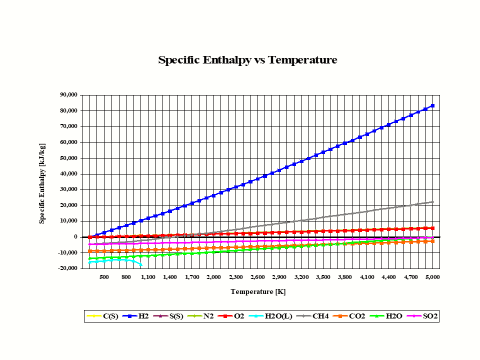Engineering Software
Real Energy Conversion Engineering Equations
This section provides free Real Energy Conversion Engineering Equations.
Here are some of the basic engineering formulas/equations related to energy conversion systems which are built into the Engineering Software product line:
Continuity Equation
m = ρvA
Momentum Equation
F = (vm + pA)out - in
Energy Equation
Q - W = ((h + v2/2 + gh)m)out - in
Ideal Gas State Equation
pv = RT
Perfect Gas
cp = constant
ϰ = cp / cv
Isentropic Compression
T2s/T1 = (p2/p1)^(ϰ-1)/ϰ
T2s/T1 = (V1/V2)^(ϰ-1)
p2/p1 = (V1/V2)^ϰ
Compression Efficiency = (T2s - T1) / (T2 - T1)
Combustion -- Flame Temperature
hproducts = hreactants - heat loss
heat loss = ((1 - combustion efficiency)HHV)/(1 + oxidant to fuel ratio)
Isentropic Expansion
T1/T2s = (p1/p2)^(ϰ-1)/ϰ
T1/T2s = (V2/V1)^(ϰ-1)
p1/p2 = (V2/V1)^ϰ
Expansion Efficiency = (T1 - T2)/(T1 - T2s)
Sonic Velocity
vs = (ϰRT/MW)^1/2
Mach Number
M = v/vs
Isentropic Flow
Tt/Ts = (1 + M^2(ϰ-1)/2)
pt/p = (1 + M^2(ϰ-1)/2)^ϰ/(ϰ-1)
ht = (hs + v^2/2)
Tt = (Ts + v^2/(2cp))
Nozzle Efficiency = (T1 - T2)/(T1 - T2s)
Diffuser Efficiency = (T2s - T1)/(T2 - T1)
Thrust
Thrust = vm + (p - pa)A
Cycle Efficiency
Cycle Efficiency = Net Work/Heat
Brayton Cycle Efficiency
Brayton Cycle Efficiency = (cp(T3 - T2) - cp(T4 - T1))/(cp(T3 - T2))
Otto Cycle Efficiency
Otto Cycle Efficiency = (cv(T3 - T2) - cv(T4 - T1))/(cv(T3 - T2))
Diesel Cycle Efficiency
Compression Ratio (CR) = V1/V2
Cut-Off Ratio (COR) = V3/V2
Diesel Cycle Efficiency = (cp(T3 - T2) - cv(T4 - T1))/(cp(T3 - T2))
Heat Rate
Heat Rate = (1/Cycle Efficiency)*3,412
For each reaction species, the thermodynamic functions specific heat, specific enthalpy and specific entropy as
functions of temperature are given in the form of least squares coefficients as follows:
Cp/R = A1 + A2T + A3T^2 + A4T^3 + A5T^4
H/(R*T) = A1 + A2T/2 + A3T^2/3 + A4T^3/4 + A5T^4/5 + A6/T
S/R = A1lnT + A2T + A3T^2/2 + A4T^3/3 + A5T^4/4 + A7
or
S/R = A1lnT + A2T + A3T^2/2 + A4T^3/3 + A5T^4/4 + A7 - lnp
For each species, two sets of coefficients are included for two adjacent temperature intervals, 273 to 1,000 [K]
and 1,000 to 5,000 [K]. The data have been constrained to be equal at 1,000 [K].
